The 51st Session of the Human Rights Council
12 September- 7 October 2022
Item 2: Interactive Dialogue with Special Rapporteur on Afghanistan
12 September 2022
By Rute Belachew / GICJ
Executive Summary
The Taliban's pledges have yet to be realised, as Afghanistan continues to survive in a dire situation. On the 12th of September 2022, during the 51st Session of the Human Rights Council, the Special Rapporteur on the Condition of Human Rights in Afghanistan, Mr. Richard Benett presented his latest report. Mr. Benett presented a summary of his trip to Afghanistan and the developing situation of human rights in the country and his recommendations for improvement. He criticised the denial of fundamental human rights to women and girls since the de facto government assumed control. Along with legislation that impedes gender equality, he stressed the prejudice encountered by women, girls, and ethnic minorities.
A considerable number of delegations voiced strong support for the Special Rapporteur's work. However, concerns were raised regarding the threats and retaliation that many female-led defenders, journalists, girls, and LGBTQI+ people suffer while fighting for their liberties. Member nations asked the Taliban to change its repressive policies against women and girls and to do the right thing for the Afghan people. They also urged the world community to continue its efforts to help those in need through humanitarian aid. Member states and the Special Rapporteur believe in including a gender perspective and a survivor-centred approach, as well as anonymising sources of information on alleged human rights violations where appropriate.
The status of the more than 4 million IDPs, particularly their capacity to seek asylum and seek treatment in neighbouring countries and elsewhere, requires immediate international assistance and will be discussed in greater detail in future reports. The Special Rapporteur will continue to report on the human rights situation in Afghanistan on a regular basis, including through public speeches and observations. He plans to conduct thematic investigations, collaborate with leading research organisations and universities, table conference room papers at the Human Rights Council, and engage with other United Nations human rights processes to keep Afghanistan's case at the top of the social and political rights agendas.
Background
The United States of America and the North Atlantic Treaty Organisation declared that military forces will leave Afghanistan on the 14th of April 2021, after more than a decade of deployments. This resulted in a power vacuum, allowing the Taliban to take effective control of the nation. On the 15th of August 2022, the Afghanistan President, Mohammad Ashraf Ghani, also fled the country. Since then, Afghanistan has endured terrible economic and human rights crises under the new government system, in addition to continuous instability. The Taliban leadership has successfully regressed the country's efforts toward equal rights and progress for women and girls. In addition, there has been an increase in violence towards ethnic minorities, restrictions on freedom of expression, peaceful assembly, economic decline, and a lack of administration of justice.
In May 2022, Mr. Richard Benett was appointed by the Human Rights Council as Special Rapporteur on the developments in Afghanistan since the fall of the Islamic Republic of Afghanistan on the 15th of August 2021 until July 2022. The Special Rapporteur presented his report on the developments of the country that he observed on his first mission to Afghanistan from the 15th to the 26th of May 2022. The report contains a collection of findings that the Special Rapporteur and his team assembled during his visit to the country’s provinces and discussions with a diverse group of Afghanis.
Report of the Special Rapporteur
Report of the Special Rapporteur on the situation of human rights in Afghanistan (A/HRC/51/6).
The report provides an initial evaluation of the situation in Afghanistan, with subsequent reports focusing on specific human rights concerns in greater depth. The visit includes the obligation to seek, receive, study, and act on information about the state of human rights in Afghanistan, as well as to give expertise. The Special Rapporteur believes that his mandate includes an essential accountability component for fact-finding and other areas, and intends to pursue this moving forward. He reinforces that his responsibility involves assisting Afghanistan in implementing its human rights commitments under treaties that it has ratified. This includes nations' obligations to investigate and prosecute significant human rights violations. Incorporating a survivor-centred methodology into the mandate's work may entail promoting the right to an effective remedy, as stated in Article 2 of the International Covenant on Civil and Political Rights. Further background may be found in Human Rights Council Resolution 48/1, in which the Council emphasises the necessity of undertaking a timely, independent, and impartial assessment in order to eliminate impunity, guarantee accountability, and bring criminals to justice. In addition, the report includes an introduction to the Special Rapporteur's vision and aims for his mandate.
The Special Rapporteur observes that women in Afghanistan have historically endured serious persecution. Nonetheless, during the last two decades, Afghanistan has made significant strides toward fulfilling the rights of women and girls. Women’s rights and gender equality were enshrined in the 2004 Constitution and other legislation, including the Law on the Elimination of Violence Against Women, ratifying the Convention on the Elimination of All Forms of Discrimination Against Women, and establishing the Ministry of Women's Affairs, the Afghanistan Independent Human Rights Commission, and specialised victim support programs and reporting standards for gender-based violence. However, since the new de facto government has taken power, women and girls have been forcibly withdrawn from all realms of public life. Despite this, they continue to be at the centre of initiatives to defend their rights and to seek redress.
Although the Special Rapporteur’s report focuses on many aspects of Afghanistan's current human rights situation , it mostly discussed the the education sector and its impact on different structures of society. Education, for both girls and boys, is an essential method of attaining other human rights and has a long-term and diverse influence throughout society. Secondary schools for girls are closed in 24 of 34 provinces, preventing around 850,000 girls from attending school. Higher education is still available to women; however, there are claims indicating that women are not authorised to take courses taught or attended by men, substantially limiting their educational prospects. This is important to the international community because discriminatory legislation against persons or groups in the field of education on any prohibited ground, including sex, violates Article 10 of the Convention on the Elimination of All Forms of Discrimination Against Women. In addition, it also is not in compliance with Article 13 of the International Covenant on Economic, Social, and Cultural Rights, to which the de facto governments are subjected as noted in the report. During the Special Rapporteur’s visit, he witnessed the dedication of many young Afghan women who stated that they were keen to continue learning despite the constraints and associated pressure to conform to archaic gender stereotypes.
In light of the deteriorating socioeconomic and humanitarian situation, as well as a lack of professional and academic prospects for girls and women, children’s rights groups in Afghanistan have documented a substantial increase in child marriage. A group of younger women informed the Special Rapporteur about the rising demand for early marriage, particularly in female-headed homes. According to the Special Rapporteur, females are being compelled to marry Taliban members as a form of family protection. While he applauds the December 2021 ruling that prohibits forced marriage, he laments that it does not establish a minimum marriage age. The Special Rapporteur is concerned that a girl under the age of 15 can be allowed to marry under the Shia Personal Status Law if her guardian can demonstrate her competency for marriage.
The Special Rapporteur also noted the disturbing prevalence of violence against women and girls, particularly domestic abuse, as well as the breakdown of systems for victims to seek protection, assistance, and accountability, and the use of the informal court system to deal with such situations. The Mahram policy makes it more difficult for survivors of gender-based abuse to seek assistance. Victims are still stigmatised and penalised, which contributes to underreporting. The Special Rapporteur spoke with female human rights defenders who were persecuted, arrested, and abused for peacefully protesting. Others have faced assault, enforced disappearance, mistreatment, or torture. The Special Rapporteur is concerned about reports that a large number of women committed suicide in 2022 and requests an immediate investigation into this matter, as well as corrective actions.
Interactive Dialogue on the Special Rapporteur’s Report
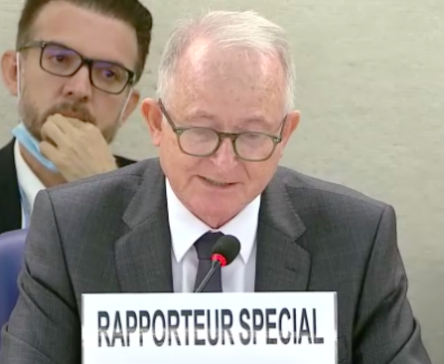 Special Rapporteur on the Condition of Human Rights in Afghanistan, Mr. Richard Benett, began by expressing his gratitude for the de facto authorities and their cooperation, allowing his presence in senior level meetings, and consultations. He lamented the fact that fundamental human rights have been stripped from women and girls since the de facto government took power. Along with the laws that undermine equal rights for genders, the report reflected on the discrimination faced by violence against women, girls, and ethnic minorities. He also acknowledges the prevalence of conflict-related violations and restrictions on freedom of expression, freedom of assembly and the lack of administration of justice in the country.
Special Rapporteur on the Condition of Human Rights in Afghanistan, Mr. Richard Benett, began by expressing his gratitude for the de facto authorities and their cooperation, allowing his presence in senior level meetings, and consultations. He lamented the fact that fundamental human rights have been stripped from women and girls since the de facto government took power. Along with the laws that undermine equal rights for genders, the report reflected on the discrimination faced by violence against women, girls, and ethnic minorities. He also acknowledges the prevalence of conflict-related violations and restrictions on freedom of expression, freedom of assembly and the lack of administration of justice in the country.
Mr. Benett discussed the current state of human rights in Afghanistan and made recommendations to the Taliban and the committee in his maiden report. He remarked that the situation in Afghanistan has deteriorated since the mandate was issued about a year ago. He argues that Afghans are entrapped and that human rights are in jeopardy. Women’s and girls' rights have continued to be violated, and political opponents have been targeted. Furthermore, there has been a crackdown on free expression that reflects authoritarianism. During his visit, he met with a variety of Afghans in Kabul, Mazar-i-Sharif, and Kandahar. He attended mosques and schools that had been targeted, along with meetings with top members of the de facto government, member states, international NGOs, and the UN in Afghanistan. He was invited to a top-level meeting by the de facto officials and has maintained engagement with the report, including contributing comments.
He remains deeply worried about the deterioration of women’s and girls' rights and civil liberties and asserted that their rights had been violated because of their gender. He urged the de facto authorities to adjust their policies in order to protect women’s rights. This is of critical international concern, and immediate action is essential. Food security is also deteriorating with time, and children in particular are subjected to terrible malnutrition and abuse, which results in forced labour and marriages. He was surprised by the number of Afghans who expressed worry about humanitarian aid not reaching those most in need, including those with disabilities, female heads of households, and ethnic minorities. The central bank's isolation from the international banking system has also driven the country's economy to the verge of crashing. As a result, the country's essential social services, such as its hospital system, have suffered. Furthermore, the country's 4 million internally displaced people and Afghan asylum seekers endure prejudice in neighbouring nations. Judicial institutions have been weakened, and security forces are being used to commit crimes, while laws threaten women’s human rights. According to the report, the de facto government can still be changed by performing the following:
- Words must be followed by action, and inclusion must be demonstrated by eliminating oppressive practices against women and girls.
- Reverse regulations that prevent women and girls from attending school and acknowledge human rights violations that have occurred.
- Protect the country's ethnic diversity and religious communities.
- Implement amnesty for former government officials.
- They must also agree that any viable governance must establish a rule of law, including monitoring of institutions, and must engage constructively with the international community.
Mr. Benett intends to collaborate with de facto authorities and other Afghan stakeholders to promote and safeguard human rights, as well as to assist them in implementing recommendations from United Nations human rights institutions. He intends to collaborate with and supplement existing UN institutions, such as the United Nations Assistance Mission in Afghanistan (UNAMA) and other UN bodies currently in Afghanistan. He will work very closely with civil society in Afghanistan and beyond, recognising its critical role in sustainable stability and prosperity. In addition, he believes that human rights advocates, particularly women, play a key role in safeguarding human rights. He will continue to investigate and respond to complaints of human rights breaches and abuses, including gathering evidence in order to bring offenders accountable.
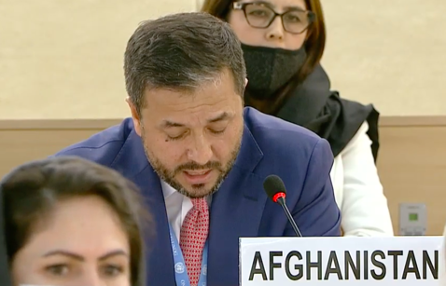 The delegate of Afghanistan was then given the floor to make a statement in response to the Special Rapporteur. He first began by recognising a group of women and girls from Afghanistan who were attending the Council. He continued by welcoming the report of the Special Rapporteur and the dedication of his teams, his visit to the country, his advocacy work, and active engagement with all stakeholders.
The delegate of Afghanistan was then given the floor to make a statement in response to the Special Rapporteur. He first began by recognising a group of women and girls from Afghanistan who were attending the Council. He continued by welcoming the report of the Special Rapporteur and the dedication of his teams, his visit to the country, his advocacy work, and active engagement with all stakeholders.
He provided a detailed update on the status of the country one year after the Taliban military takeover. Currently, minorities are oppressed and subjected to widespread, systematic attacks. Girls continue to be prohibited from secondary education, and women are denied security and independence. While the civic spaces are extremely constrained, retaliatory killings and forced disappearances continue. Barriers to the access of healthcare, livelihood, food, and security remain, and aid is insufficient and not distributed to the most vulnerable. Musicians and the arts are still under assault, and cultural heritage is being destroyed. Those who seek to leave the nation and embark on the perilous journey, encounter violence from other countries.
He emphasised that respect for human rights is an essential component of a legitimate government, as well as a vital benchmark for any foreign engagement, including the distribution of aid. He cautions that the Taliban is equipped with a discriminating and totalitarian mindset and that they are brutally pursuing their goal of subjecting civilians. Civilians have been killed, and there have been major fatal bombings in several areas. Torture, ill-treatment and mass punishment, detentions, and forced disappearances also persist. Alarmingly, international terrorist organisations have returned to the country, and the threat of terrorism in the country, region, and beyond is unavoidable.
Finally, while he supports the Rapporteur and his recommendations, he stated that the report fails to convey the entire nature and scope of the breaches and abuses occurring throughout the country. Insufficient resources and incapacity to visit sites where atrocities are taking place, notably in the north, and the rigorous monitoring and mass retribution have made it difficult to comprehend the dire situation. He goes on to say that many violations remain unreported and that there has to be more accountability and comprehensive public investigations. He closed his address by urging the Council to press for rigorous accountability for Afghanistan, adding that "where there is a will, there is a way."
The delegate of the European Union began by expressing gratitude for the special report and his work. He stated that the EU is gravely concerned about the rise in human rights breaches and abuses, as well as violations of international humanitarian law. He reiterates the need for accountability, adding that Afghanistan is a signatory to the Rome Statute. He reaffirmed the EU's steadfast commitment to the full, equal, and meaningful involvement of all women and girls in all aspects of Afghan society. Human rights and basic freedoms remain a top priority for the EU, and the Taliban has so far failed to keep any pledges made to meet those freedoms. He urged the Taliban to let the human rights mandate be fully implemented. He ended his remarks by asking the Special Rapporteur how having specific access to Afghan land has influenced the work and how the Human Rights Council might help his mission in following up on this first crucial report.
The delegate of Pakistan, on behalf of the Organization of Islamic Cooperation (OIC), thanked the Rapporteur and noted the findings and recommendations as crucial to the serious concerns over the humanitarian, human rights social and economic situation in Afghanistan. He points to the conflict and instability for the decades of this product. He reaffirmed their call for respecting human rights and freedoms for all - including women, children and minorities. The OIC maintains unflinching endorsement for an Afghan-led national consolidation process and supports the SR's appeal to the international community to continue providing humanitarian aid and seeking ways to assist the Afghan economy in its resistance. He emphasises the significance of long-term, mutually reinforcing international involvement that focuses on stability through human rights, and development with the participation of Afghanistan and its people. Mr. Hashmi concludes his remarks by adding that they successfully launched a trust fund and a food security programme as a sign of solidarity with the Afghan people and their objective of stability, peace, and prosperity.
The delegate of Denmark, on behalf of a group of baltic countries, welcomed the Special Rapporteur's report and expressed the delegation's grave concern about the continuing erosion of Afghanistan's human rights situation. She stated her concern about the rapid deterioration of Afghan women’s and girls' human rights and fundamental freedoms such as the right to work, education, freedom of movement, expression, and peaceful assembly, and called on the Taliban to fully recognise all people's human rights and fundamental freedoms. Ms. Ruge also expressed the delegation's concern about the report of arbitrary detention allegations and discrimination against media workers and human rights defenders. The humanitarian crisis with half of the population in need of humanitarian aid and many on the verge of hunger is worrying, as constraints on human rights and basic freedoms tighten and space for NGOs and civil society shrinks. Ms. Ruge closed her comments by asking the Special Rapporteur how it engages the Taliban to ensure the execution of the report's recommendations.
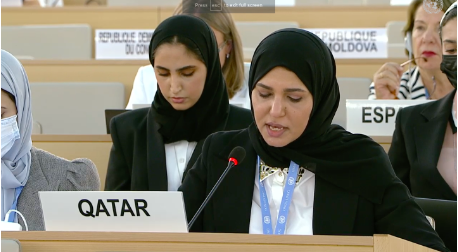 The delegate of Qatar welcomed the report for the Special Rapporteur and encouraged a continuation of dialogue with Afghanistan. She went on to express her worry that 18.9 million people are suffering from food insecurity, which has a negative impact on vulnerable populations, notably women and children. Additionally, the lack of of access to healthcare and the continued limitations in the banking sector is cause for alarm. She praised the efforts made, notably the peace deals in Afghanistan and the evacuation of more than 75,000 Afghans, as well as the assistance provided to other residents. The country has also given US $75 million through a donor conference in an effort to respond to the humanitarian crisis. She welcomed the Special Rapporteur's presence in Doha and meetings with Qatari officials to determine how they can assist Afghanistan while adhering to humanitarian principles.
The delegate of Qatar welcomed the report for the Special Rapporteur and encouraged a continuation of dialogue with Afghanistan. She went on to express her worry that 18.9 million people are suffering from food insecurity, which has a negative impact on vulnerable populations, notably women and children. Additionally, the lack of of access to healthcare and the continued limitations in the banking sector is cause for alarm. She praised the efforts made, notably the peace deals in Afghanistan and the evacuation of more than 75,000 Afghans, as well as the assistance provided to other residents. The country has also given US $75 million through a donor conference in an effort to respond to the humanitarian crisis. She welcomed the Special Rapporteur's presence in Doha and meetings with Qatari officials to determine how they can assist Afghanistan while adhering to humanitarian principles.
The delegate of Ireland opened his remarks by stressing that Afghanistan's condition remains dire while under the hands of the Taliban. He was particularly worried by credible claims of extrajudicial killings, arbitrary arrests, and mistreatment. Ireland is gravely concerned about fundamental human rights violations against women and girls. Furthermore, the delegation is deeply concerned about the poor human rights situation for LGBTI+ people in Afghanistan, as well as people with disabilities and members of ethnic and religious minorities. He concluded his remarks by asking the Special Rapporteur what efforts should be taken to defend the rights of Afghan minorities while the nation continues to face a humanitarian and economic deterioration.
The representative of UN Women stressed the systematic worsening of women’s and girls' rights after the Taliban's takeover. She further added that the plight of women and girls in Afghanistan should serve as a wake-up call because it illustrates how years of progress in women’s rights and gender equality can be destroyed in a matter of months. She reiterated that the fight for women’s rights in Afghanistan is a global fight for womens’ rights. She urged that sympathy must be met with tangible measures in response to any prejudice against women and girls. She further stated that UN Women is prepared to collaborate with member states to support efforts aimed at restoring the full spectrum of women’s rights in Afghanistan and that the organisation will continue to support women-led organisations and women human rights defenders who are at the vanguard of the world's worst women suffrage crisis.
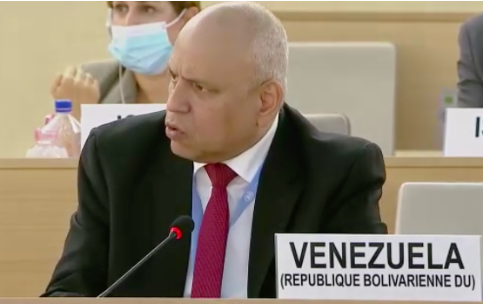 The delegate of Venezuela spoke in opposition to the mandate, indicating that Venezuela had been opposed to the resolution that led to this mandate from the outset of the endeavour. He added that the heinous military action is the root cause of the humanitarian calamity that has gripped the Afghan people. Consequently , he believes that this further violated their human rights and harmed the country's economic and social progress. He continued by claiming that the formation of the interventionist mechanism was more about enjoying impunity and preventing access to their own resources and funds from the World Bank and the IMF. This has resulted in famine and indescribable misery among the Afghan population, hindering the country's rehabilitation. He continued by declaring that, like other country-based mandates, the Special Rapporteur did not provide any specific proof of the human rights situation. Instead, he believes that the Rapporteur was preoccupied with giving remote reports in the interest of the mission. In conclusion, he stated his support for the Afghan people but encouraged the Council to follow its mission and refrain from holding certain select nations' mandates.
The delegate of Venezuela spoke in opposition to the mandate, indicating that Venezuela had been opposed to the resolution that led to this mandate from the outset of the endeavour. He added that the heinous military action is the root cause of the humanitarian calamity that has gripped the Afghan people. Consequently , he believes that this further violated their human rights and harmed the country's economic and social progress. He continued by claiming that the formation of the interventionist mechanism was more about enjoying impunity and preventing access to their own resources and funds from the World Bank and the IMF. This has resulted in famine and indescribable misery among the Afghan population, hindering the country's rehabilitation. He continued by declaring that, like other country-based mandates, the Special Rapporteur did not provide any specific proof of the human rights situation. Instead, he believes that the Rapporteur was preoccupied with giving remote reports in the interest of the mission. In conclusion, he stated his support for the Afghan people but encouraged the Council to follow its mission and refrain from holding certain select nations' mandates.
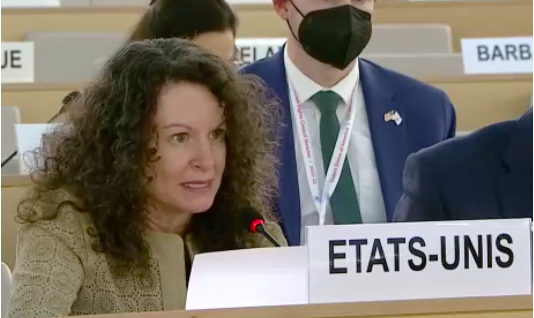 The delegate of the United States of America expressed her appreciation for Mr. Bennett's report and the diligent work on behalf of the Afghan people. She stated that the U.S. fully supports the Rapporteur’s mandate and is particularly concerned about the human rights situation in Kabul after the Taliban's takeover. She went on to emphasise the importance of the Special Rapporteur's and civil society groups' ongoing reporting, as it provides member states with perspective into the condition of the Afghan people. The U.S. delegation is particularly concerned about the growing limitations on women and girls in their many forms. She urged the Taliban to reverse their harsh edict, which is to blame for their brutality, and establish accountability to keep their commitments to the Afghan people. The development of the U.S. Afghan consultative mechanism was developed to better aid the Afghan people as they seek complete respect for human rights and fundamental freedoms. She closed her remarks by asking the Special Representative what the international community can do to assist the Afghan people's aspirations and advance their human rights and basic freedoms.
The delegate of the United States of America expressed her appreciation for Mr. Bennett's report and the diligent work on behalf of the Afghan people. She stated that the U.S. fully supports the Rapporteur’s mandate and is particularly concerned about the human rights situation in Kabul after the Taliban's takeover. She went on to emphasise the importance of the Special Rapporteur's and civil society groups' ongoing reporting, as it provides member states with perspective into the condition of the Afghan people. The U.S. delegation is particularly concerned about the growing limitations on women and girls in their many forms. She urged the Taliban to reverse their harsh edict, which is to blame for their brutality, and establish accountability to keep their commitments to the Afghan people. The development of the U.S. Afghan consultative mechanism was developed to better aid the Afghan people as they seek complete respect for human rights and fundamental freedoms. She closed her remarks by asking the Special Representative what the international community can do to assist the Afghan people's aspirations and advance their human rights and basic freedoms.
Geneva International Centre for Justice’s Position
Geneva International Centre for Justice (GICJ) is concerned about the deterioration of the social and economic prosperity of Afghanistan after the takeover of the Taliban government. The de facto government has gone against their promises of providing equal opportunity to women and girls. However, we are disappointed at the continued discrimination faced by minorities in the country. We stress the importance of continuing dialogue to address this issue, and we urge States, the United Nations, the international community, and institutions to develop and implement policies aimed at protecting Afghans, specifically women and girls. We urge for immediate action to be taken to stop said violations and ask for mechanisms to continue supporting the Special Rapporteur and his team in continued dialogue with the de facto government.
Afghanistan, Women’s Rights, Human Rights, Justice, Human Rights Council, Geneva, geneva4justice, GICJ, Geneva International Centre For Justice, HRC51




